- Home
- F. Paul Wilson
The Keep ac-1 Page 8
The Keep ac-1 Read online
Page 8
"It won't work," he said.
"Of course it will." Kaempffer's smugness was unbearable. "It always has and always will. These partisans feed on the backslapping they get from their drinking companions. They play the hero and milk the role for all it's worth—until their friends start dying, or until their wives and children are marched off. Then they become good little peasants again."
Woermann searched for a way to save those villagers. He knew they'd had nothing to do with the killings. "This time is different."
"I hardly think so. I do believe, Klaus, that I've had far more experience with this sort of thing than you."
"Yes ... Auschwitz, wasn't it?"
"I learned much from Commandant Hoess."
"You like learning?" Woermann snatched the major's hat from the desk and tossed it to him. "I'll show you something new! Come with me!"
Moving swiftly and giving Kaempffer no time to ask questions, Woermann led him down the tower stairs to the courtyard, then across to another stairway leading down to the cellar. He stopped at the rupture in the wall and lit a lamp, then led Kaempffer down a mossy stairway into the cavernous subcellar.
"Cold down here," Kaempffer said, his breath misting in the lamplight as he rubbed his hands together.
"It's where we keep the bodies. All six of them."
"You haven't shipped any back?"
"I didn't think it wise to ship them out one at a time ... might cause talk among the Romanians along the way... not good for German prestige. I had planned to take them all with me when I left today. But as you know, my request for relocation was denied."
He stopped before the six sheet-covered figures on the hard-packed earth, noting with annoyance that the sheets over the bodies were in disarray. It was a minor thing, but he felt the least that could be done for these men before their final burial was to treat their remains with respect. If they had to wait before being returned to their homeland, they ought to wait in clean uniforms and a neatly arranged shroud.
He went first to the man most recently killed and pulled back the sheet to expose the head and shoulders.
"This is Private Remer. Look at his throat."
Kaempffer did so, his face impassive.
Woermann replaced the sheet, then lifted the next, holding the lamp up so Kaempffer could get a good look at the ruined flesh of another throat. He then continued down the line, saving the most gruesome for last.
"And now—Private Lutz."
Finally, a reaction from Kaempffer: a tiny gasp. But Woermann gasped, too. Lutz's face stared back at them upside down. The top of his head had been set against the empty spot between his shoulders; his chin and the mangled stump of his neck were angled away from his body toward the empty darkness.
Quickly, gingerly, Woermann swiveled the head until it sat properly, vowing to find the man who had been so careless with the remains of a fallen comrade, and to make him regret it. He carefully rearranged all the sheets, then turned to Kaempffer.
"Do you understand now why I tell you hostages won't make a bit of difference?"
The major didn't reply immediately. Instead, he turned and headed for the stairs and warmer air. Woermann sensed that Kaempffer had been shaken more than he had shown.
"Those men were not just killed," Kaempffer said finally. "They were mutilated!"
"Exactly! Whoever or whatever is doing this is utterly mad! The lives of ten villagers won't mean a thing."
"Why do you say 'whatever'?"
Woermann held Kaempffer's gaze. "I'm not sure. All I know is that the killer comes and goes at will. Nothing we do, no security measure we try, seems to matter."
"Security doesn't work," Kaempffer said, regaining his former bravado as they re-entered the light and the warmth of Woermann's quarters, "because security isn't the answer. Fear is the answer. Make the killer afraid to kill. Make him fear the price others are going to have to pay for his action. Fear is your best security, always."
"And what if the killer is someone like you? What if he doesn't give a damn about the villagers?"
Kaempffer didn't answer.
Woermann decided to press the point. "Your brand of fear fails to work when you run up against your own kind. Take that back to Auschwitz when you go."
"I'll not be returning to Poland, Klaus. When I finish up here—and that should only take me a day or two—I'll be heading south to Ploiesti."
"I can't see any use for you there—no synagogues to burn, only oil refineries."
"Continue making your snide little comments, Klaus," Kaempffer said, nodding his head ever so slightly as he spoke through tight lips. "Enjoy them now. For once I get my Ploiesti project under way, you will not dare to speak to me so."
Woermann sat down behind his rickety desk. He was growing weary of Kaempffer. His eyes were drawn to the picture of his younger son, Fritz, the fifteen-year-old.
"I still fail to see what attraction Ploiesti could hold for the likes of you."
"Not the refineries, I assure you—I leave them to the High Command to worry about."
"Gracious of you."
Kaempffer did not appear to hear. "No, my concern is the railways."
Woermann continued staring at the photo of his son. He echoed Kaempffer: "Railways."
"Yes! The greatest railway nexus in Romania is to be found at Ploiesti, making it the perfect place for a resettlement camp."
Woermann snapped out of his trance and lifted his head. "You mean like Auschwitz?"
"Exactly! That's why the Auschwitz camp is where it is. A good rail network is crucial to efficient transportation of the lesser races to the camps. Petroleum leaves Ploiesti by rail for every part of Romania." He had spread his arms wide; he began to bring them together again. "And from every corner of Romania trains will return with carloads of Jews and Gypsies and all the other human garbage abroad in this land."
"But this isn't occupied territory! You can't—"
"The Führer does not want the undesirables of Romania to be neglected. It's true that Antonescu and the Iron Guard are removing the Jews from positions of influence, but the Führer has a more vigorous plan. It has come to be known in the SS as 'The Romanian Solution.' To implement it, Reichsführer Himmler has arranged with General Antonescu for the SS to show the Romanians how it is done. I have been chosen for that mission. I will be commandant of Camp Ploiesti."
Appalled, Woermann found himself unable to reply as Kaempffer warmed to his subject.
"Do you know how many Jews there are in Romania, Klaus? Seven hundred and fifty thousand at last count. Perhaps a million! No one knows for sure, but once I start an efficient record system, we'll know exactly. But that's not the worst of it—the country is absolutely crawling with Gypsies and Freemasons. And worse yet: Muslims! Two million undesirables in all!"
"If only I had known!" Woermann said, rolling his eyes and pressing his hands against the side of his face. "I never would have set foot in this sinkhole of a country!"
Kaempffer heard him this time. "Laugh if you wish, Klaus, but Ploiesti will be most important. Right now we are transferring Jews all the way from Hungary to Auschwitz at a great waste of time, manpower, and fuel. Once Camp Ploiesti is functioning, I foresee many of them being shipped to Romania. And as commandant, I shall become one of the most important men in the SS ... in the Third Reich! Then it shall be my turn to laugh."
Woermann remained silent. He had not laughed ... he found the whole idea sickening. Facetiousness was his only defense against a world coming under the control of madmen, against the realization that he was an officer in the army that was enabling them to achieve that control. He watched Kaempffer begin to coil back and forth about the room again.
"I didn't know you were a painter," the major said, stopping before the easel as if seeing it for the first time. He studied it a moment in silence. "Perhaps if you had spent as much time ferreting out the killer as you obviously have on this morbid little painting, some of your men might—"
"Morbid
! There's nothing at all morbid about that painting!"
"The shadow of a corpse hanging from a noose—is that cheerful?"
Woermann was on his feet, approaching the canvas. "What are you talking about?"
Kaempffer pointed. "Right there... on the wall."
Woermann stared. At first he saw nothing. The shadows on the wall were the same mottled gray he had painted days ago. There was nothing that even faintly resembled ... no, wait. He caught his breath. To the left of the window in which the village sat gleaming in the sunrise ... a thin vertical line connecting to a larger dark shape below it. It could be seen as a hunched corpse hanging from a rope. He vaguely remembered painting the line and the shape, but in no way had he intended to add this gruesome touch to the work. He could not bear, however, to give Kaempffer the satisfaction of hearing him admit that he saw it, too.
"Morbidity, like beauty, is in the eye of the beholder."
But Kaempffer's mind was already moving elsewhere. "It's lucky for you the painting's finished, Klaus. After I've moved in, I'll be much too busy to allow you to come up here and fiddle with it. But you can resume after I'm on my way to Ploiesti."
Woermann had been waiting for this, and was ready for it. "You're not moving into my quarters."
"Correction: my quarters. You seem to forget that I outrank you, Captain."
Woermann sneered. "SS rank! Worthless! Worse than meaningless. My sergeant is four times the soldier you are! Four times the man, too!"
"Be careful, Captain. That Iron Cross you received in the last war will carry you only so far!"
Woermann felt something snap inside him. He pulled the black-enameled, silver-bordered Maltese cross from his tunic and held it out to Kaempffer. "You don't have one! And you never will! At least not a real one—one like this, without a nasty little swastika at its center!"
"Enough!"
"No, not enough! Your SS kills helpless civilians—women, children! I earned this medal Fighting men who were able to shoot back. And we both know," Woermann said, his voice dropping to a fierce whisper, "how much you dislike an enemy who shoots back!"
Kaempffer leaned forward until his nose was barely an inch from Woermann's. His blue eyes gleamed in the white fury of his face. "The Great War ... that is all past. This is the Great War—my war. The old war was your war, and it's dead and gone and forgotten!"
Woermann smiled, delighted that he had finally penetrated Kaempffer's loathsome hide. "Not forgotten. Never forgotten. Especially your bravery at Verdun!"
"I'm warning you," Kaempffer said. "I'll have you—" And then he closed his mouth with an audible snap.
For Woermann was moving forward. He had stomached all he could of this strutting thug who discussed the "liquidation" of millions of defenseless lives as matter-of-factly as he might discuss what he was going to have for dinner. Woermann made no overtly threatening gesture, yet Kaempffer took an involuntary step backward at his approach. Woermann merely walked past him and opened the door.
"Get out."
"You can't do this!"
"Out."
They stared at each other for a long time. For a moment he thought Kaempffer might actually challenge him. Woermann knew the major was in better condition and physically stronger—but only physically. Finally, Kaempffer's gaze wavered and he turned away. They both knew the truth about SS-Sturmbannführer Kaempffer. Without a word, he picked up his black greatcoat and stormed out of the room. Woermann closed the door quietly behind him.
He stood still for a moment. He had let Kaempffer get to him. His control used to be better. He walked over to the easel and stared at his canvas. The more he looked at the shadow he had painted on the wall, the more it looked like a hanging corpse. It gave him a queasy feeling and annoyed him as well. He had meant for the sunlit village to be the focus of the painting, but all he could see now was that damned shadow.
He tore himself away and returned to his desk, staring again at the photograph of Fritz. The more he saw of men like Kaempffer, the more he worried about Fritz. He hadn't worried this much when Kurt, the older boy, had been in combat in France last year. Kurt was nineteen, a corporal already. A man now.
But Fritz—they were doing things to Fritz, those Nazis. The boy had somehow been induced to join the local Jugendführer, the Hitler Youth. When Woermann had been home on his last leave, he had been hurt and dismayed to hear his son's fourteen-year-old mouth regurgitating that Aryan Master Race garbage, and speaking of "Der Führer" with an awed reverence that had once been reserved for God alone. The Nazis were stealing his son from him right under his nose, turning the boy into a snake like Kaempffer. And there did not seem to be a thing Woermann could do about it.
There didn't seem to be anything he could do about Kaempffer either. He had no control over the SS officer. If Kaempffer decided to shoot Romanian peasants, there was no way to stop him, other than to arrest him. And he could not do that. Kaempffer was here by authority of the High Command. To arrest him would be insubordination, an act of brazen defiance. His Prussian heritage rebelled at the thought. The army was his career, his home ... it had been good to him for a quarter century. To challenge it now...
Helpless. That was how he felt. It brought him back to a clearing outside Posnan, Poland, a year and a half ago, shortly after the fighting had ended. His men had been setting up bivouac when the sound of automatic gunfire came from over the next rise, about a mile away. He had gone to investigate. Einsatzkommandos were lining up Jews—men and women of all ages, children—and systematically slaughtering them with fusillades of bullets. After the bodies had been rolled into the ditch behind them, more were lined up and shot. The ground had turned muddy with blood and the air had been full of the reek of cordite and the cries of those who were still alive and in agony, and to whom no one would bother to administer a coup de grâce.
He had been helpless then, and he was helpless now. Helpless to make this war into one of soldier against soldier, helpless to stop the thing that was killing his men, helpless to stop Kaempffer from slaughtering those Romanian villagers.
He slumped into the chair. What was the use? Why even try anymore? Everything was changing for the worse. He had been born with the century, a century of hope and promise. Yet he was fighting in his second war, a war he could not understand.
And yet he had wanted this war. He had yearned for a chance to strike back at the vultures who had settled upon the Fatherland after the last war, saddling it with impossible reparations, grinding its face into the dirt year after year after year. His chance had come, and he had participated in some of the great German victories. The Wehrmacht was unstoppable.
Why, then, did he feel such malaise? It seemed wrong for him to want to be out of it all and back in Rathenow with Helga. It seemed wrong to be glad that his father, also a career officer, had died in the Great War and could not see what atrocities were being done today in the name of the Fatherland.
And still, with everything so wrong, he held on to his commission. Why? The answer to that one, he told himself for the hundredth—possibly the thousandth—time, was that in his heart he believed the German Army would outlast the Nazis. Politicians came and went, but the army would always be the army. If he could just hold on, the German Army would be victorious, and Hitler and his gangsters would fade from power. He believed that. He had to.
Against all reason, he prayed that Kaempffer's threat against the villagers would have the desired effect—that there would be no more deaths. But if it didn't work ... if another German was to die tonight, Woermann knew whom he wanted it to be.
TEN
The Keep
Tuesday, 29 April
0118 hours
Major Kaempffer lay awake in his bedroll, still rankling at Woermann's contemptuous insubordination. Sergeant Oster, at least, had been helpful. Like most regular army men, he responded with fearful obedience to the black uniform and the Death's Head insignia—something to which Oster's commanding officer seemed quite immune.
But then, Kaempffer and Woermann had known each other long before there was an SS.
The sergeant had readily found quarters for the two squads of einsatzkommandos and had suggested a dead-end corridor at the rear of the keep as a compound for the prisoners from the village. An excellent choice: The corridor had been carved into the stone of the mountain itself and provided entry to four large rooms. Sole access to the retention area was through another long corridor running at an angle directly out to the courtyard. Kaempffer assumed that the section originally had been designed as a storage area since the ventilation was poor and there were no fireplaces in the rooms. The sergeant had seen to it that the entire length of both corridors, from the courtyard to the blank stone wall at the very end, was well lit by a new string of light bulbs, making it virtually impossible for anyone to surprise the einsatzkommandos who would be on guard in pairs at all times.
For Major Kaempffer himself, Sergeant Oster had found a large, double-sized room on the second level within the rear section of the keep. He had suggested the tower, but Kaempffer had refused; to have moved into the first or second level would have been convenient but would have meant being below Woermann. The fourth tower level involved too many steps to be taken too many times a day. The rear section of the keep was better. He had a window overlooking the courtyard, a bed-frame commandeered from one of Woermann's enlisted men, and an unusually heavy oak door with a secure latch. His bedroll was now supported by the newly made frame, and the major lay within it, a battery lamp on the floor beside him.
His eyes came to rest on the crosses in the walls. They seemed to be everywhere. Curious. He had wanted to ask the sergeant about them but had not wanted to detract from his posture of knowing everything. This was an important part of the SS mystique and he had to maintain it. Perhaps he would ask Woermann—when he could bring himself to speak to him again.
Woermann ... he couldn't get the man off his mind. The irony of it all was that Woermann was the last person in the world Kaempffer would have wished to be billeted with. With Woermann around he could not be the type of SS officer he wished to be. Woermann could fix his gaze on him and pierce right through the SS uniform, through the veneer of power, and see a terrified eighteen-year-old. That day in Verdun had been a turning point in both their lives...

 Crisscross
Crisscross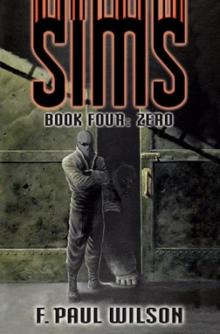 Ground Zero
Ground Zero Short Stories
Short Stories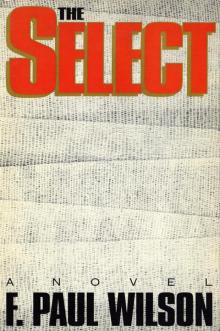 The Select
The Select Codename
Codename Bloodline
Bloodline A Soft Barren Aftershock
A Soft Barren Aftershock The Tomb
The Tomb The Complete LaNague
The Complete LaNague The Tery
The Tery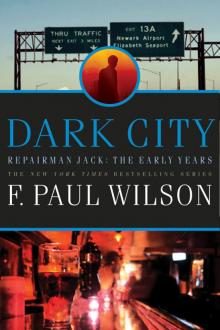 Dark City
Dark City Deep as the Marrow
Deep as the Marrow The Fifth Harmonic
The Fifth Harmonic Conspiracies
Conspiracies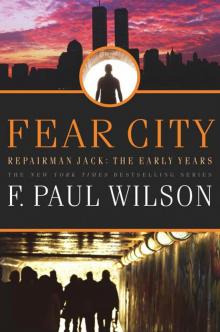 Fear City
Fear City Wheels Within Wheels
Wheels Within Wheels Wayward Pines
Wayward Pines The Portero Method
The Portero Method All the Rage
All the Rage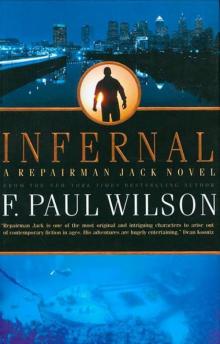 Infernal
Infernal The Barrens & Others
The Barrens & Others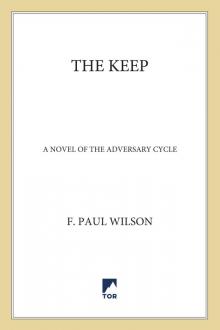 The Keep
The Keep Quick Fixes: Tales of Repairman Jack
Quick Fixes: Tales of Repairman Jack Virgin
Virgin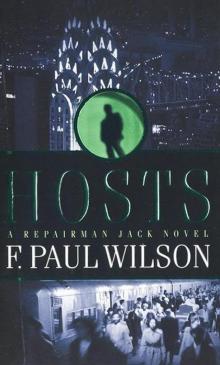 Hosts
Hosts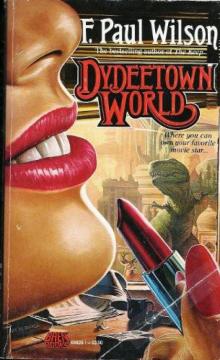 Dydeetown World
Dydeetown World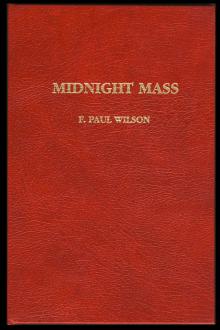 Midnight Mass
Midnight Mass Black Wind
Black Wind The Christmas Thingy
The Christmas Thingy The Last Rakosh
The Last Rakosh The Last Christmas: A Repairman Jack Novel
The Last Christmas: A Repairman Jack Novel SIMS
SIMS Thy Brother's Keeper
Thy Brother's Keeper Panacea
Panacea The Touch
The Touch Scenes from the Secret History
Scenes from the Secret History Scenes From the Secret History (The Secret History of the World)
Scenes From the Secret History (The Secret History of the World)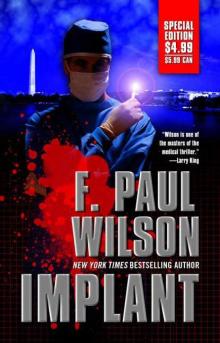 Implant
Implant The Dark at the End
The Dark at the End Fatal Error
Fatal Error Wardenclyffe
Wardenclyffe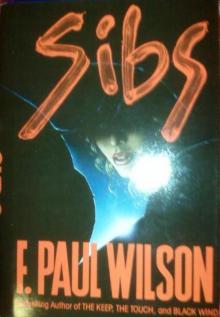 Sibs
Sibs The God Gene
The God Gene The Void Protocol
The Void Protocol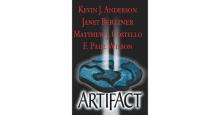 Artifact
Artifact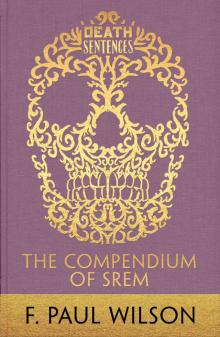 The Compendium of Srem
The Compendium of Srem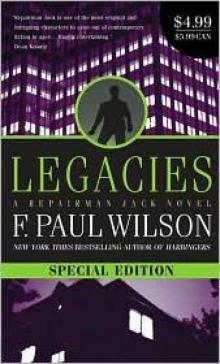 Legacies
Legacies Reprisal
Reprisal Jack: Secret Vengeance
Jack: Secret Vengeance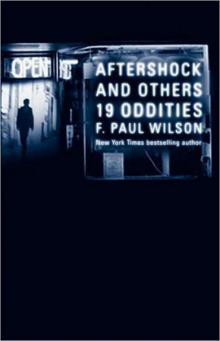 Aftershock & Others: 19 Oddities
Aftershock & Others: 19 Oddities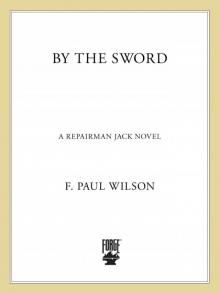 By the Sword
By the Sword Interlude at Duane's (Thriller: Stories to Keep You Up All Night)
Interlude at Duane's (Thriller: Stories to Keep You Up All Night) Fatal Error rj-13
Fatal Error rj-13 Crisscross rj-8
Crisscross rj-8 Codename: Chandler: Fix (Kindle Worlds Novella)
Codename: Chandler: Fix (Kindle Worlds Novella)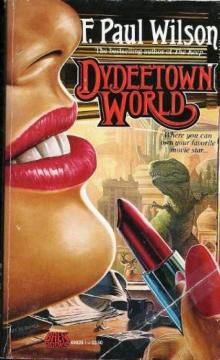 Dydeetown World lf-4
Dydeetown World lf-4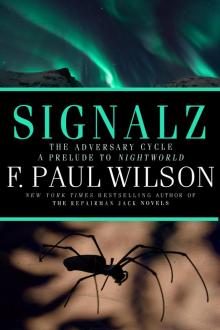 Signalz
Signalz Codename_Chandler_Fix
Codename_Chandler_Fix The Dark at the End (Repairman Jack)
The Dark at the End (Repairman Jack) The Complete Adversary Cycle: The Keep, the Tomb, the Touch, Reborn, Reprisal, Nightworld (Adversary Cycle/Repairman Jack)
The Complete Adversary Cycle: The Keep, the Tomb, the Touch, Reborn, Reprisal, Nightworld (Adversary Cycle/Repairman Jack) Repairman Jack 03 - Conspiracies
Repairman Jack 03 - Conspiracies Ground Zero rj-13
Ground Zero rj-13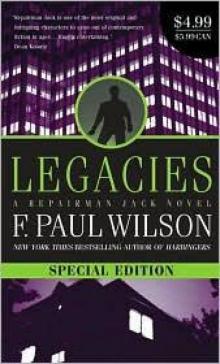 Repairman Jack 02 - Legacies
Repairman Jack 02 - Legacies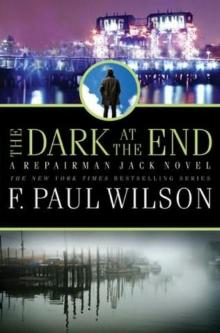 The Dark at the End rj-15
The Dark at the End rj-15![Repairman Jack [02]-Legacies Read online](http://i1.bookreadfree.com/i/03/21/repairman_jack_02-legacies_preview.jpg) Repairman Jack [02]-Legacies
Repairman Jack [02]-Legacies Double Threat
Double Threat The Tery lf-5
The Tery lf-5 The God Gene: A Novel
The God Gene: A Novel Wayward Pines: The Widow Lindley (Kindle Worlds Novella)
Wayward Pines: The Widow Lindley (Kindle Worlds Novella)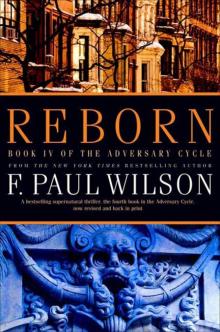 Reborn ac-4
Reborn ac-4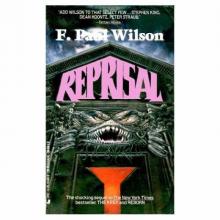 Reprisal ac-5
Reprisal ac-5 New Title 1
New Title 1 Healer lf-3
Healer lf-3 An Enemy of the State lf-1
An Enemy of the State lf-1 Interlude at Duane's
Interlude at Duane's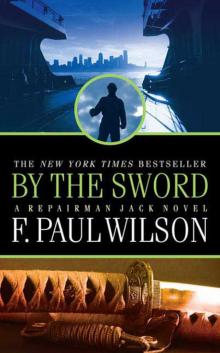 By the Sword rj-12
By the Sword rj-12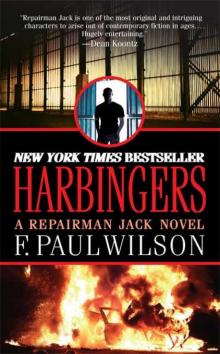 Hardbingers rj-10
Hardbingers rj-10 Wheels Within Wheels lf-2
Wheels Within Wheels lf-2 Jack: Secret Circles
Jack: Secret Circles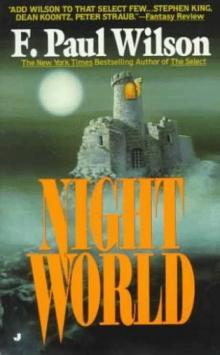 Nightworld ac-6
Nightworld ac-6 Quick Fixes - tales of Repairman Jack
Quick Fixes - tales of Repairman Jack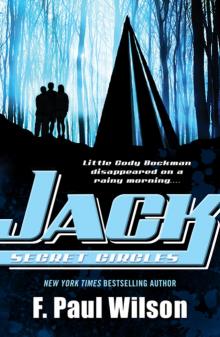 Secret Circles yrj-2
Secret Circles yrj-2 Jack: Secret Histories
Jack: Secret Histories Haunted Air rj-6
Haunted Air rj-6 An Enemy of the State - a novel of the LaNague Federation (The LaNague Federation Series)
An Enemy of the State - a novel of the LaNague Federation (The LaNague Federation Series)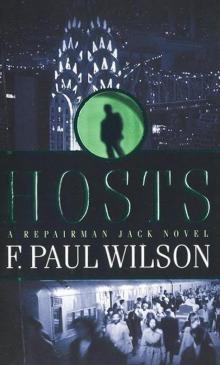 Repairman Jack 05 - Hosts
Repairman Jack 05 - Hosts Cold City (Repairman Jack - the Early Years Trilogy)
Cold City (Repairman Jack - the Early Years Trilogy) The Peabody-Ozymandias Traveling Circus & Oddity Emporium
The Peabody-Ozymandias Traveling Circus & Oddity Emporium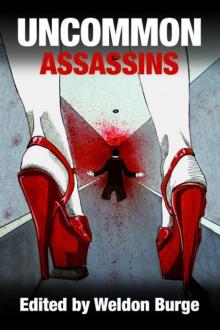 Uncommon Assassins
Uncommon Assassins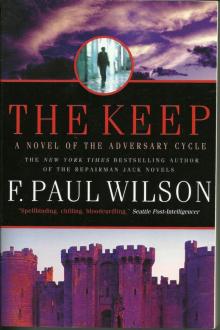 Adversary Cycle 01 - The Keep
Adversary Cycle 01 - The Keep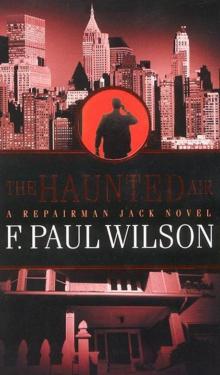 Repairman Jack 06 - The Haunted Air
Repairman Jack 06 - The Haunted Air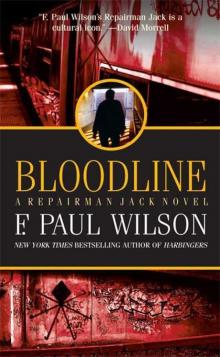 Bloodline rj-11
Bloodline rj-11 Ultimate Supernatural Horror Box Set
Ultimate Supernatural Horror Box Set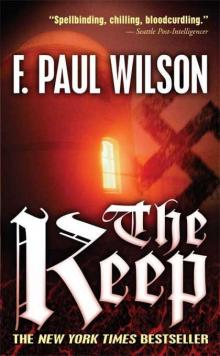 The Keep ac-1
The Keep ac-1 Repairman Jack 04 - All the Rage
Repairman Jack 04 - All the Rage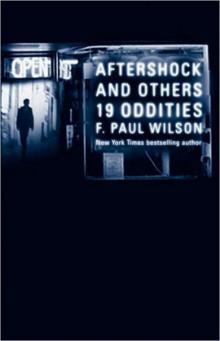 Aftershock & Others
Aftershock & Others All the Rage rj-4
All the Rage rj-4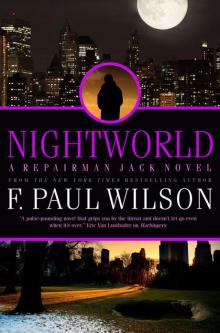 Nightworld (Adversary Cycle/Repairman Jack)
Nightworld (Adversary Cycle/Repairman Jack) Conspircaies rj-3
Conspircaies rj-3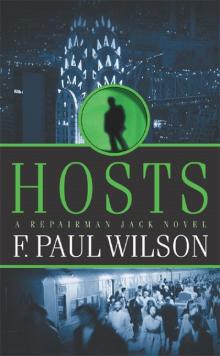 Hosts rj-5
Hosts rj-5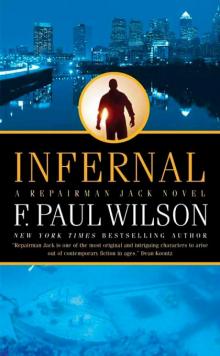 Infernal rj-9
Infernal rj-9 The God Gene: A Novel (The ICE Sequence)
The God Gene: A Novel (The ICE Sequence)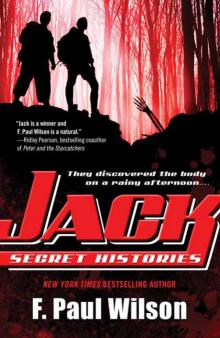 Secret Histories yrj-1
Secret Histories yrj-1